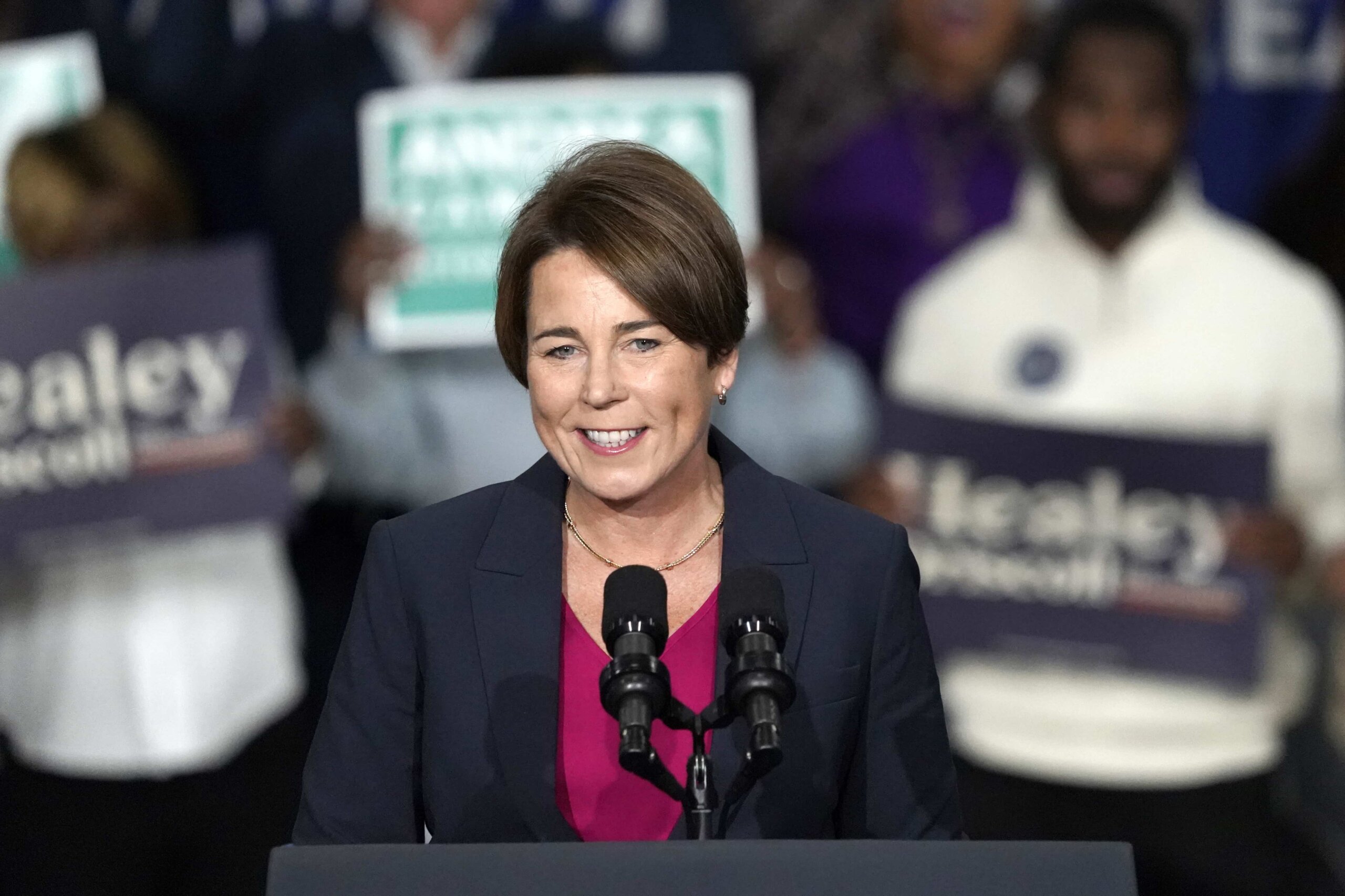With record numbers of LGBTQ2S+ candidates running in the 2022 U.S. midterm elections, advocates were hoping for a second “rainbow wave” to sweep the country—though others predicted LGBTQ2S+ representation could take a hit.
But despite pessimistic predictions from some pundits, advocates are celebrating a number of historic wins—with the HRC noting a record number of LGBTQ2S+ people elected to Congress at the national level, along with several other notable firsts in state legislatures. Here’s what you need to know about what happened last night.
At the state level
- In Massachusetts, Democrat Maura Healey made history last night when she became the first ever out lesbian governor in the U.S. Healey’s election alongside lieutenant governor Kim Driscoll also marks the first time that two women have been elected to those positions at the same time in the U.S.
- Oregon Democrat Tina Kotek will also share the honour of first out lesbian governor with Healey, after winning a much closer race against Republican Christine Drazan. Kotek’s race took longer to call, as Oregon conducts its elections exclusively by mail—meaning that its results often take much longer to tabulate than states that conduct elections using in-person voting.
- In New Hampshire, Democrat James Roesener became the first out trans man elected to a state legislature in U.S. history. There are currently just eight out trans state legislators across the country, none of whom are trans men, according to the Victory Fund.
- In Minnesota, Democrat Leigh Finke became the first out trans state legislator in the state—as well as one of the first out queer women elected to the state’s legislature, along with Erin Maye Quade. Per Victory Fund, LGBTQ2S+ representation in the Minnesota state legislature more than doubled after last night’s elections.
- In Montana, Zooey Zephyr became the first out trans person ever elected to the state legislature. Zephyr made the decision to run after testifying before the legislature on the state’s anti-trans sports bill last year, according to LGBTQ Nation.
- Also in Montana, Democrat SJ Howell became the first out non-binary state legislator. Both Howell and Zephyr were heavily favoured to win their races going into the midterm election.
- In Texas, Democrats Christian Manuel-Hayes and Venton Jones became the first out Black LGBTQ2S+ men ever elected to the state’s legislature.
- Also in Texas, Democrat Jolanda Jones—who initially became the first out Black lesbian candidate ever elected to the state’s legislature in a May special election—once again coasted to victory, and will serve a full term.
- In Michigan, Democrat Jason Hoskins became the first out gay person of colour elected to the state’s legislature.
- In South Dakota, Kameron Nelson became the first out LGBTQ2S+ man ever elected to the state’s legislature. Prior to the election, South Dakota was one of four states with no out LGBTQ2S+ state legislators.
- In Alaska, Jennie Armstrong and Andrew Gray became the first LGBTQ2S+ people elected to the state’s legislature.
- In Ohio, Democrat Jim Obergefell lost his bid for state legislature to Republican incumbent D.J. Swearingen. Obergefell is widely known for being lead plaintiff in the 2015 Supreme Court case that legalized same-sex marriage across the U.S.
- In the Texas gubernatorial race, Democrat Beto O’Rourke lost to incumbent Republican Greg Abbott. Abbott’s partner in crime Attorney General Ken Paxton also won reelection to serve a third term in office.
- And in Florida’s gubernatorial race, Democratic challenger Charlie Crist lost to incumbent Republican Ron DeSantis.
In Congress
- In Vermont, Democrat Becca Balint became the first woman and first out LGBTQ2S+ person ever elected to Congress in the state. Prior to her win, Vermont was the only U.S. state to have never elected a woman to Congress.
- In Illinois, Democrat Eric Sorensen became the first out LGBTQ2S+ person elected to Congress in the state.
- In Florida, Maxwell Frost became the first Gen Z member of Congress. Frost’s victory was a crucial one for progressive activists in the Sunshine state, where anti-LGBTQ2S+ legislation has come to dominate state politics over the past several years. At 25 years old, Frost is the minimum age necessary to be a member of the House.
- In California, Democrat Robert Garcia became the first LGBTQ2S+ immigrant ever elected to Congress.
- In New Hampshire and Kansas, incumbents Chris Pappas and Sharice Davids won their races to remain the first and only out LGBTQ2S+ members of Congress in their respective states.
Abortion
- Five states—California, Kentucky, Michigan, Montana and Vermont—voted to secure abortion rights in last night’s election, joining Kansas which previously did the same in its August primary. The move is significant in the wake of the Supreme Court’s June decision to overturn Roe v. Wade, and demonstrates a strong public support for abortion rights in the face of the ruling—with exit polls across the nation noting that abortion, alongside inflation, was a top issue for voters this election.


 Why you can trust Xtra
Why you can trust Xtra


